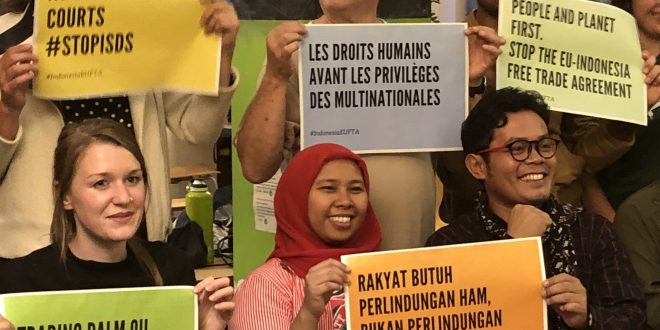Civil coalition raises concerns over Indonesia-EU CEPA talks
The Jakarta Post
Jakarta | Sat, July 21 2018
Civil coalition raises concerns over Indonesia-EU CEPA talks

An Indonesian civil society coalition has voiced concerns over the ongoing talks in the Indonesia-European Union Comprehensive Economic Partnership Agreement (I-EU CEPA), which entered its fifth round this month.
The coalition met, along with several other European civilian coalitions, with the Indonesian delegates on the sidelines of the I-EU CEPA’s fifth round in Brussels, Belgium, from July 9 to 13.
Rachmi Hertanti, executive director of Indonesia for Global Justice (IGJ), one of the civil groups in the coalition, said their discussion with the Indonesian delegates included concerns about investment, intellectual property and labor.
She lamented that the parties involved in the I-EU CEPA had not published drafts of the agreement, making it difficult for stakeholders to calculate the consequences.
For example, the Indonesian government has not elaborated in detail on a chapter in the agreement pertaining to trade liberalization.
“The government has been progressing [in the talks] but they were not open about which sectors will be given full access to European businesses,” Rachmi said at a press conference recently.
On the other hand, the European Commission has uploaded its proposals in the agreement on its official website, albeit not the entire agreement draft, The Jakarta Post observed.
The coalition, Rachmi went on, noted that within the agreement existed subchapters on investor-state dispute settlements (ISDS), which could weaken Indonesia as it would give more ways for European businesses to take legal action against the government.
Other aspects include performance requirements coming from the EU’s side, where Indonesia was urged not to burden investors with too many rules, such as minimum local employee requirements and local content requirements (TKDN).
“If [the EU] is given too much leeway, our competitiveness and product diversification will not develop,” said Rachmi.
Furthermore, the coalition revealed its suspicions that a substantial amount of discussions were related to palm oil — a subject of constant dispute between Indonesia and the EU in the past few years — from Indonesia’s side.
Speaking during the same occasion, Indonesian Forum for the Environment (Walhi) manager for climate justice Yuyun Harmono said, as Indonesia had been known to lose ground in palm oil-related disputes, bringing up palm oil during the talks could lead to unjust trade-offs that would disadvantage them.
In March, Indonesia gained a partial win when the European Court of Justice (ECJ) ruled in favor of Indonesia over antidumping duties imposed by the EU on palm oil, thus allowing Indonesia’s palm oil to enter the European market again.
The latest agreement by the European Commission, the European Parliament and the Council of the EU (EU Member States) also postponed the phasing out of palm oil-based biofuel to 2030 from previously 2021, much to Indonesia’s delight.
“The Netherlands absorbs about 70 percent of Indonesia’s crude palm oil [CPO] exports to the EU. The Dutch processes the raw product and distributes it to the rest of Europe […] so actually, there is no added value at all for us in exporting CPO [to Europe],” said Yuyun.
When the Post requested a comment from Trade Ministry director general for international trade negotiations Iman Pambagyo, one of Indonesia’s negotiators in the I-EU CEPA, he denied that palm oil was included in the talks.
“We are not discussing palm oil,” Iman said via text message recently.
The comment somehow contradicted his earlier remarks as published in an official statement shortly after the fifth round of the talks, in which he said the government had “continued to voice concerns over the issue of palm oil” during the forum.
EU head of delegation and ambassador to Indonesia and Brunei Darussalam Vincent Guérend previously said the debate over palm oil would not hamper discussions.
“We are not specifically talking about palm oil [in the EU-CEPA], because we have 15 chapters to discuss. It may be one aspect in a wider issue, but from our point of view we had no problem at all. We imposed no tariff and half of palm oil [products] enters with no duty,” Guérend said.





